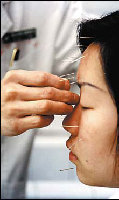IN BRIEF (Page 19)
Vit D cuts breast cancer risk
A new study confirms previously anecdotal evidence that vitamin D actually reduces the risk of breast cancer in women, German researchers conclude.
The just-released findings of a long-term study involving 1,394 breast cancer patients and an equal number of healthy post menopausal women were surprisingly clear.
Women with a low level of vitamin D in their blood run a considerably greater risk of breast cancer. The effectiveness of the vitamin was found to be strongest in women who do not undergo Hormone Replacement Therapy.
Foods rich in vitamin D include sea fish (cod liver oil), eggs and dairy products. But vitamin D is mainly produced by the human body itself, with the aid of sunlight.
Rheumatism treated too late
Sufferers of rheumatism are often treated too late because the disease is not immediately detected, experts say.
"People with painful, soft swelling of one or more joints should see a rheumatologist within six weeks of appearance of the first symptoms," Edmund Edelmann, head of the Association of German Rheumatologists, said at a medical convention in Berlin.
The same advice applies to people whose joints remain stiff for 30 minutes or more after getting out of bed each morning, he added, going on to remark that although rheumatic care has improved, shortcomings remain.
Magnetic Resonance Imaging (MRIs) and high-resolution ultrasound could help diagnose rheumatism considerably earlier than traditional X-ray machines, Edelmann said.
Alzheimer plaque in mice cleared
It is possible to eliminate protein accumulations, or plaques, characteristic of Alzheimer's disease from the brains of mice, researchers report, by fostering macrophages (scavenger immune cells). Macrophage activity is inhibited by TGF-beta, an organic compound whose purpose is to halt runaway reactions. Previous research shows that levels of TGF-beta are highest in the brains of victims of Alzheimer's disease, according to the report in the research journal Nature Medicine.
Kids do cost Mom her teeth
There could be a lot of truth in the German folk saying, "Every child costs mother one tooth," research implies. Women giving birth to a higher-than-average number of children tend to lose more teeth in their lifetime, regardless of income bracket, US researchers have found.
Diabetes worse for young adults
Patients diagnosed with type 1 diabetes in young adulthood are, relative to their peers, at greater risk of death from the disease than those diagnosed in childhood, according to a report in the journal Diabetes Care. Dr Richard G. Feltbower of Leeds University, UK, and his colleagues reached this conclusion after examining death rates and causes of death among patients with type 1 diabetes entered in a database in Yorkshire, UK, between 1978 and 2004. The subjects, who were all under 30 years of age, were then correlated with the UK National Health Service Central Register for death notifications.
Acupuncture helps in post-op care

Acupuncture helps alleviate lingering pain and decreased shoulder mobility in people who have had surgery for head and neck cancer, researchers said on Saturday at a meeting of the American Society of Clinical Oncology in Chicago. The ancient Chinese therapy also significantly improves xerostomia, or dehydrated mouth, a condition occurring in people who have had radiation treatment for head and neck cancer, they added.
Agencies
(China Daily 06/04/2008 page19)














